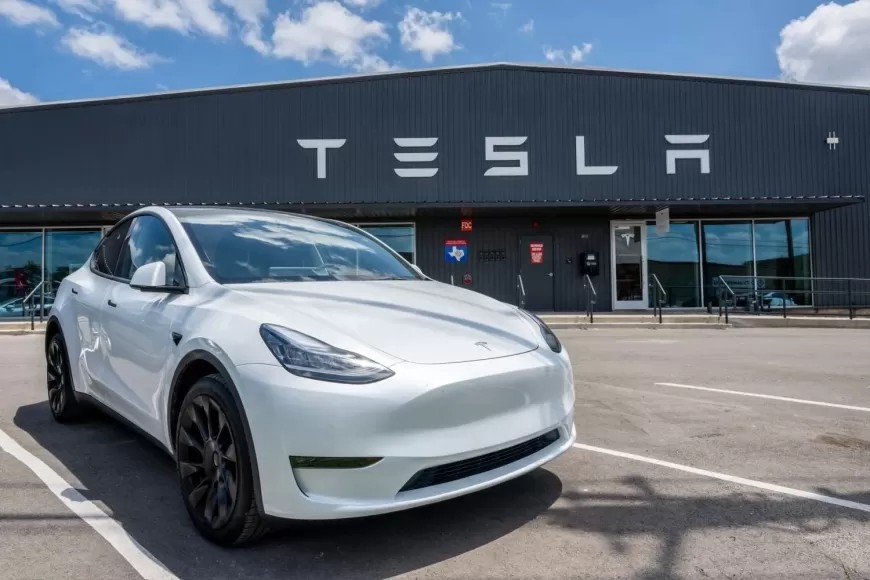Tesla Reports First Annual EV Sales Drop in Over a Decade Due to Market Challenges
Tesla’s EV sales in 2024 dropped to 1.79 million, marking the first decline in over 10 years. Market demand, competition, and policy changes impact growth.

Tesla Inc. has experienced its first drop in annual vehicle sales in more than 10 years, despite achieving record deliveries in the final quarter of 2024. The company announced total sales of 1.79 million vehicles for the year, falling short of both its 2023 performance and Wall Street expectations.
Missed Targets in 2024
In the fourth quarter, Tesla delivered 495,570 vehicles—missing analysts’ estimates of 512,277 and falling short of the 515,000 deliveries required to meet its goal of slight annual growth. The announcement sent Tesla’s stock tumbling by as much as 7.6%, a sharp contrast to its 63% rally in 2024.
Barclays analyst Dan Levy described the results as highlighting ongoing struggles for 2025 growth, particularly as Tesla remains dependent on its existing models and the yet-to-be-revealed Model 2.5.
A Year of Setbacks
Tesla faced significant challenges in 2024, including a factory arson attack in Berlin, shipping delays, and a broader slowdown in EV sales. To cut costs, Tesla reduced its workforce by more than 10%, including sales teams.
Despite these difficulties, the company attempted to boost sales with year-end deals on financing, leasing, and charging packages. However, these efforts weren’t enough to offset lukewarm demand, especially as the market adjusted to a maturing EV industry.
Musk’s Growth Plans for 2025
CEO Elon Musk remains optimistic, projecting 20%-30% growth in 2025. Musk attributed this outlook to a new, more affordable electric vehicle expected to debut in the first half of the year, alongside advancements in Tesla’s autonomous driving technology.
Details about the upcoming vehicle, including pricing and design, remain vague, and analysts have expressed skepticism about Tesla’s ability to meet these growth targets. Additionally, the incoming administration of President-elect Donald Trump could create uncertainty. A rollback of EV tax credits, a policy Trump has criticized, could impact demand across the industry, though Musk believes Tesla would be less affected than its competitors.
On the flip side, Trump’s potential relaxation of self-driving car regulations could provide a boost to Tesla’s plans for robotaxis and other autonomous initiatives.
Competitors Close the Gap
Tesla’s competition in the EV market continues to grow. Chinese automaker BYD Co. sold 4.25 million electric and hybrid vehicles in 2024, closing in on Tesla’s global dominance. Tesla’s Shanghai factory delivered 916,660 vehicles last year, a 3% decline from 2023, while December sales of the Model 3 and Model Y in China were flat year-over-year at 93,766 units.
Globally, the Model 3 and Model Y remained Tesla’s bestsellers, accounting for 471,930 fourth-quarter deliveries. Tesla’s “other models” category, including the Model X, S, and Cybertruck, totaled 23,640 deliveries.
Cybertruck Incident Sparks Investigation
Tesla’s Cybertruck faced scrutiny this week following a deadly explosion outside a Trump hotel in Las Vegas. The incident, which killed the driver and injured others, prompted an FBI investigation into potential connections with another attack in New Orleans that claimed 15 lives.
Musk stated on social media that Tesla’s investigation found the explosion was caused by an item in the truck bed, unrelated to the vehicle itself.
Energy Division Shines
Amid the challenges, Tesla’s energy business reported a record year, deploying 31.4 gigawatt hours of energy products in 2024, including 11 gigawatt hours in the fourth quarter. This marks a significant increase compared to the 14.7 gigawatt hours deployed in all of 2023.
Also Read: Tesla Stock Surge Faces Challenges with Potential Sales Decline in 2024

































































